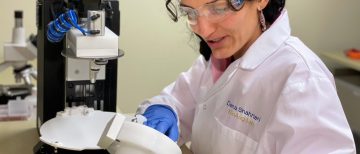Jennifer Nevin
CLINCAL INSTRUCTOR Division:Reconstruction & Oncology Hospital Site:Vancouver – Vancouver General Hospital Dr. Jennifer Nevin is a clinical instructor who specializes in orthopaedic oncology with a focus on upper extremity reconstruction following oncology surgery. Dr. Nevin completed her medical degree and residency training in orthopaedics at the University of British Columbia. She then went on to […]
UBC Orthopaedics Researchers Attract CIHR Fall 2021 Funding to Develop Adult Spinal Deformity Surgical Planning and Failure Prediction Toolkit
Congratulations to UBC Department of Orthopaedics Professor and Principle Investigator Dr. Thomas Oxland and co-investigators, Associate Professor Dr. John Street and Professor Dr. David Wilson, on being awarded a Canadian Institutes of Health Research (CIHR) Project Grant Fall 2021.
Dr. Robert McCormack honoured with Canadian Football League’s Hugh Campbell Distinguished Leadership Award
The Canadian Football League (CFL) has honoured Dr. Robert McCormack, Professor Emeritus with UBC Department of Orthopaedics, with a Hugh Campbell Distinguished Leadership Award in recognition of his exemplary service in establishing and maintaining the league’s health and safety protocols during the COVID-19 pandemic.
In the News! UBC leading the way in spinal cord injury research
Dr. Dena Shahriari, Assistant Professor at UBC’s Department of Orthopedics and the School of Biomedical Engineering, discussed a new project developing treatments for spinal cord injury on CKNW Mornings with Simi.
In the News! UBC researchers look at ‘gel’ biomaterials to help treat spinal cord injuries
UBC’s Mend the Gap team is leading an international effort to develop a new way to treat spinal cord injuries, which they hope will lead to increased motor function and a better quality of life for patients. (CTV, Vancouver Sun, The Province)




